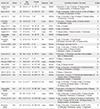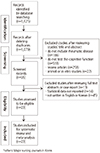1. de Melo LF, Da-Silva SL. Neuropsychological assessment of cognitive disorders in patients with fibromyalgia, rheumatoid arthritis, and systemic lupus erythematosus. Rev Bras Reumatol. 2012; 52(2):181–188. DOI:
10.1590/S0482-50042012000200003.
2. Ministry of Health & Welfare, Korea Centers for Disease Control & Prevention. Korea health statistics 2011: Korea national health and nutrition examination survey (KNHANES V-2). Seoul: Author of Health & Welfare;2012.
4. Bartolini M, Candela M, Brugni M, Catena L, Mari F, Pomponio G, et al. Are behaviour and motor performances of rheumatoid arthritis patients influenced by subclinical cognitive impairments? A clinical and neuroimaging study. Clin Exp Rheumatol. 2002; 20(4):491–497.
5. Julian LJ, Yazdany J, Trupin L, Criswell LA, Yelin E, Katz PP. Validity of brief screening tools for cognitive impairment in rheumatoid arthritis and systemic lupus erythematosus. Arthritis Care Res (Hoboken). 2012; 64(3):448–454. DOI:
10.1002/acr.21566.
6. Dick BD, Verrier MJ, Harker KT, Rashiq S. Disruption of cognitive function in fibromyalgia syndrome. Pain. 2008; 139(3):610–616. DOI:
10.1016/j.pain.2008.06.017.
7. Glass JM. Fibromyalgia and cognition. J Clin Psychiatry. 2008; 69:Suppl 2. 20–24.
8. Zachrisson O, Regland B, Jahreskog M, Kron M, Gottfries CG. A rating scale for fibromyalgia and chronic fatigue syndrome (the Fibro Fatigue scale). J Psychosom Res. 2002; 52(6):501–509. DOI:
10.1016/S0022-3999(01)00315-4.
9. Hanly JG, Su L, Omisade A, Farewell VT, Fisk JD. Screening for cognitive impairment in systemic lupus erythematosus. J Rheumatol. 2012; 39(7):1371–1377. DOI:
10.3899/jrheum.111504.
10. Fava A, Plastino M, Cristiano D, Span A, Cristofaro S, Opipari C, et al. Insulin resistance possible risk factor for cognitive impairment in fibromialgic patients. Metab Brain Dis. 2013; 28(4):619–627. DOI:
10.1007/s11011-013-9421-3.
11. Tomietto P, Annese V, D'Agostini S, Venturini P, La Torre G, De Vita S, et al. General and specific factors associated with severity of cognitive impairment in systemic lupus erythematosus. Arthritis Rheum. 2007; 57(8):1461–1472. DOI:
10.1002/art.23098.
12. Can SS, Gencay-Can A. Assessment of cognitive function in patients with fibromyalgia using the clock drawing test. J Musculoskelet Pain. 2012; 20(3):177–182. DOI:
10.3109/10582452.2012.704145.
13. Higgins JPT, Green S. Cochrane handbook for systematic reviews of interventions version 5.1.0. London, UK: The Cochrane Collaboration;2011.
14. PRISMA. Preferred reporting items for systematic reviews and meta-analyses (PRISMA) [Internet]. London, UK: Author;2013. cited 2015 January 15. Available from:
http://www.prismastatement.org/News.aspx.
16. Winblad B, Palmer K, Kivipelto M, Jelic V, Fratiglioni L, Wahlund LO, et al. Mild cognitive impairment-beyond controversies, towards a consensus: Report of the international working group on mild cognitive impairment. J Intern Med. 2004; 256(3):240–246. DOI:
10.1111/j.1365-2796.2004.01380.x.
17. Cummings G, Lee H, Macgregor T, Davey M, Wong C, Paul L, et al. Factors contributing to nursing leadership: A systematic review. J Health Serv Res Policy. 2008; 13(4):240–248. DOI:
10.1258/jhsrp.2008.007154.
18. Bolanowski SJ, Gescheider GA, editors. Comprehensive metaanalysis: A computer program for research synthesis. Englewood, NJ: Biostat Inc.;1991.
19. Song HY. Meta analysis. Paju: Cheong Moon Gak Publishing Co.;1998.
20. Meguro K, Ishii H, Yamaguchi S, Ishizaki J, Sato M, Hashimoto R, et al. Prevalence and cognitive performances of clinical dementia rating 0.5 and mild cognitive impairment in Japan. The Tajiri project. Alzheimer Dis Assoc Disord. 2004; 18(1):3–10. DOI:
10.1097/00002093-200401000-00002.
21. Sutton AJ, Duval SJ, Tweedie RL, Abrams KR, Jones DR. Empirical assessment of effect of publication bias on meta-analyses. BMJ. 2000; 320(7249):1574–1577.
22. Bour A, Rasquin S, Boreas A, Limburg M, Verhey F. How predictive is the MMSE for cognitive performance after stroke? J Neurol. 2010; 257(4):630–637. DOI:
10.1007/s00415-009-5387-9.
23. El-Shafey AM, Abd-El-Geleel SM, Soliman ES. Cognitive impairment in non-neuropsychiatric systemic lupus erythematosus. Egypt Rheumatol. 2012; 34(2):67–73. DOI:
10.1016/j.ejr.2012.02.002.
24. Oh HS, Kim JS, Shim EB, Seo WS. Development and clinical validity of a mild vascular cognitive impairment assessment tool for Korean stroke patients. Asian Nurs Res. 2015; 9(3):226–234. DOI:
10.1016/j.anr.2015.04.005.
25. Park M, Sung MR, Kim SK, Lee DY. Comparison of demographic characteristics, comorbidity, and health habits of older adults with mild cognitive impairment and older adults with normal cognitive function. J Korean Acad Nurs. 2014; 44(4):351–360. DOI:
10.4040/jkan.2014.44.4.351.
26. Vidoni ED, Townley RA, Honea RA, Burns JM. Alzheimer disease biomarkers are associated with body mass index. Neurology. 2011; 77(21):1913–1920. DOI:
10.1212/WNL.0b013e318238eec1.
27. Reitz C, Tang MX, Manly J, Mayeux R, Luchsinger JA. Hypertension and the risk of mild cognitive impairment. Arch Neurol. 2007; 64(12):1734–1740. DOI:
10.1001/archneur.64.12.1734.
28. Murray SG, Yazdany J, Kaiser R, Criswell LA, Trupin L, Yelin EH, et al. Cardiovascular disease and cognitive dysfunction in systemic lupus erythematosus. Arthritis Care Res (Hoboken). 2012; 64(9):1328–1333. DOI:
10.1002/acr.21691.
29. Anderson JK, Zimmerman L, Caplan L, Michaud K. Measures of rheumatoid arthritis disease activity: Patient (PtGA) and Provider (PrGA) Global Assessment of Disease Activity, Disease Activity Score (DAS) and Disease Activity Score with 28-Joint Counts (DAS28), Simplified Disease Activity Index (SDAI), Clinical Disease Activity Index (CDAI), Patient Activity Score (PAS) and Patient Activity Score-II (PASII), Routine Assessment of Patient Index Data (RAPID), Rheumatoid Arthritis Disease Activity Index (RADAI) and Rheumatoid Arthritis Disease Activity Index-5 (RADAI-5), Chronic Arthritis Systemic Index (CASI), Patient-Based Disease Activity Score With ESR (PDAS1) and Patient-Based Disease Activity Score without ESR (PDAS2), and Mean Overall Index for Rheumatoid Arthritis (MOI-RA). Arthritis Care Res (Hoboken). 2011; 63:Suppl 11. S14–S36. DOI:
10.1002/acr.20621.
30. Royall DR, Palmer RF. Alzheimer's disease pathology does not mediate the association between depressive symptoms and subsequent cognitive decline. Alzheimers Dement. 2013; 9(3):318–325. DOI:
10.1016/j.jalz.2011.11.009.






 PDF
PDF ePub
ePub Citation
Citation Print
Print





 XML Download
XML Download